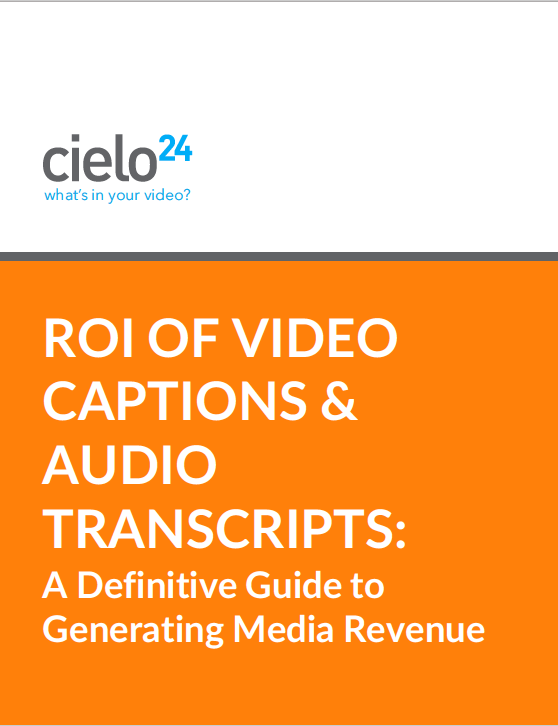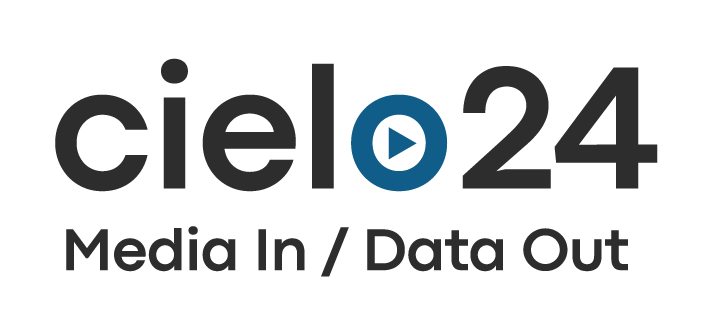cielo24 Listed As an Approved Captioning Service for Amazon Video Direct We are excited to be…

How to Choose a Video Captioning Service
How to Choose a Video Captioning Service
Creating closed captions files is a technical process that few content creators have the knowledge or resources to do on their own. Today there are many professional captioning services to choose from, so knowing exactly what you are looking for is key. We will walk you through how to choose a video captioning service so you can start leveraging your videos right away.
Why Caption Video In the First Place?

Before we dive into how to choose a video captioning service, let’s remind ourselves of why captioning is so important. There are many reasons to caption online videos.
Accessibility compliance is first and foremost, especially for schools and organizations subject to the Americans with Disabilities Act, Section 508, or similar laws. Broadcasters are subject to the Twenty-First Century Communications and Video Accessibility Act of 2010 (CVAA) which covers the internet delivery of programs that originated on broadcast television.
Beyond compliance, there are a host of ways that captions add value to video. For one, closed captions are a great way to make programs accessible for viewers who speak multiple languages, have trouble processing auditory components, or want to watch videos in sound-sensitive environments (hello social media video viewers).
In terms of search, discovery, and engagement, captions are one of the most powerful pieces of data out there. Because the internet is text-based, video content stays hidden from search engines. With a closed caption file, you are able to deliver a text-based transcript of the video to search engines, opening all of the video’s content to search, not just the title and description.
To learn in detail about these captioning benefits for education and enterprise, you can download both of our eBooks below:
- Beyond Accessibility: Captioning Benefits in Higher Education
- ROI of Video Captioning: A Definitive Guide to Generating Media Revenue
What is a Transcript?
The high-quality captions are made with a high-quality transcript. A transcript is a written version of the speech in a video. Creating this transcript is the first and most important part of generating captions. Once the video is transcribed, the transcript is time-synchronized so that the captions appear with the correct timing.
Transcripts are useful for translations, multilingual support, SEO, viewer comprehension and more. Transcription is the most difficult part of the captioning process and is best left to professionals.
Many people believe that voice recognition software (ASR) can be used to create a caption transcript. In reality, ASR and YouTube auto-captions can only transcribe to 50-70% accuracy, leading to confusing and often nonsensical captions. Furthermore, if you are looking for sophisticated search and navigation within videos, ASR just doesn’t cut it. We address this further in the next section.
Should I Use a Professional Video Captioning Service or Free Machine Captions?
Knowing how to choose a video captioning service starts with being able to see long-run costs. Machine captions may appear economical at first, but there can be hidden costs when it comes to quality and scalability. As we talked about above, free software applications use ASR to generate machine captions that can only hit about 50-70% accuracy.
Once those captions are created, you will have to go in manually and edit the captions. Editing the quality of the captions is an important step for two reasons. One, the inaccuracy will have a negative impact on viewer engagement and two, if you are subject to the ADA, CVAA, or Section 508, or want to include those with hearing disabilities in your audience, your videos must be captioned to 99% accuracy.

This can be a very slow process, but it is acceptable if you are on a tight budget, aren’t under any time pressure to caption, and only have a few short videos. Just remember: while getting the captions may be free, editing them for accuracy will cost you in labor. The money that you put toward editing machine captions can be better spent on a professional captioning service that will provide you with countless other advantages.
In terms of ease, cost-effectiveness, turnaround time, quality, and more, hiring a professional video captioning service is the best route to go. A full-service video captioning provider supplies you with much more than just captions, from SEO and media intelligence to translation services and dedicated account management. Furthermore, many video captioning services have their own APIs as well as integrate with major video platforms such as YouTube, Kaltura, and BrightCove.
A growing number of organizations in enterprise, government, and education are reaching out to professional vendors for their captioning needs. They see the value that captions have for their audience members, as well as their value in improving ROI, SEO, and all around marketing efforts. As accessibility laws expand beyond government and education, we expect the use of video captioning services to only grow.
What Are My Needs?
The better you understand your needs, the easier it will be to find the right captioning vendor and service agreement. We’ve compiled a list of 14 essential questions that you should answer before choosing a video captioning service.
- Volume: How many minutes/hours of video do we have?
- Turnaround Time: How fast do we need the captions to be rendered? Do we need them in a few hours or can we wait a few days? Do we want the ability to specify different turnaround times for different videos?
- Quality Level: Do we need different quality levels such as 70% machine-generated for search, 95% accurate for internal notes, or near-perfect for published transcripts or captions?
- Difficulty: Do we have videos with poor sound quality, multiple speakers, heavy accents, or technical/rare terms?
- Language: Do we need videos to be transcribed in multiple languages or translated into any other languages?
- Integration: Do we need the caption provider integrated into our custom workflow via a comprehensive API?
- Video Hosting: Do we use a video platform like YouTube, Kaltura, BrightCove, Panopto, etc. that already has an integration with a captioning service?
- Caption Editor: Do we want to have the power to edit the captions ourselves to make minor corrections?
- Video Intelligence: Do we want to create high-quality video tags for Youtube, Google search including topics, keywords or Google Adwords?
- Interactive Transcript: Do we want viewers to be able to search and navigate videos through transcripts or tags?
- Video SEO: Do we want our videos to be ranked and discovered by YouTube or Google search?
- Customer Service: Do we want reliable daily support for questions or issues?
- Account Management: Do we need a service that can provide access and support for multiple departments at our organization?
- Flexibility: Do we want to have a flexible service that allows us to customize all aspects of the workflow to fit our particular needs?
The answers to these questions will help you narrow your search and find a provider who is the best match for your needs. Knowing how to choose a video captioning service really comes down to knowing everything about your videos, from how you publish them to what you want to accomplish with them.
Putting It All Together
 Hopefully, we have shed some light on how to choose a video captioning service. Knowing what is required by law for your organization is the first step. Next, you must decide who you want to include in your audience. While you may not be subject to federal law, you may still want to make your videos accessible to the 360 million Americans who have a hearing disability.
Hopefully, we have shed some light on how to choose a video captioning service. Knowing what is required by law for your organization is the first step. Next, you must decide who you want to include in your audience. While you may not be subject to federal law, you may still want to make your videos accessible to the 360 million Americans who have a hearing disability.
After that, think about your goals for the video. Is it a marketing piece that you want to get ranked on Google and YouTube and have high social engagement? Is it an employee training video that you want to be easily found in your database through search tags? Is it an eLearning video that you want your students to be able to navigate through using search terms?
Sussing out the purpose of your videos and what you hope to do with them will enable you to choose a video captioning service that aligns with your needs. Answering the 14 essential questions will make the acquisition process smooth and ensure that you don’t miss out on services that you want, as well as don’t pay for services you don’t need.
We hope you feel confident in knowing how to choose a video captioning service. cielo24 is a full-service captioning and transcription provider that specializes in accessibility compliance and video ROI. You can view a breakdown of cielo24’s unique services here and request a free quote here.



